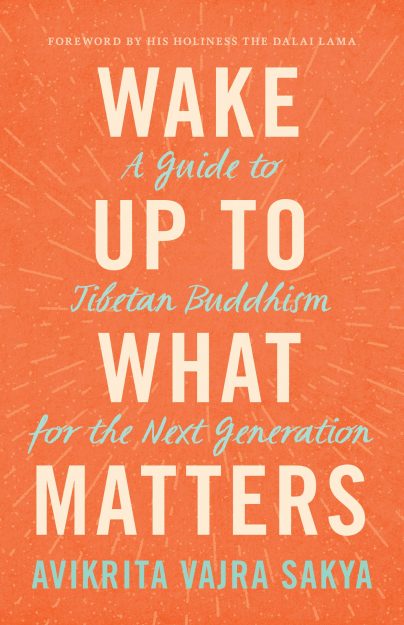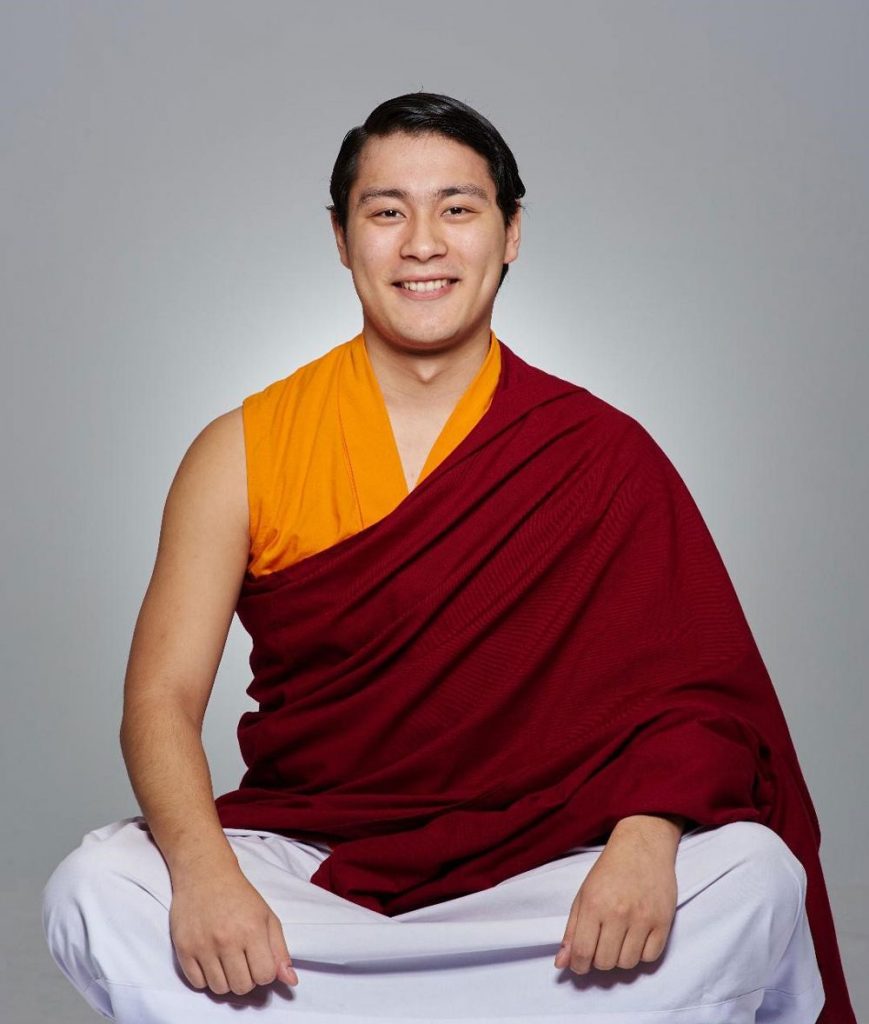How can we deal with everyday stress?
It’s really important that we take time each and every day, even if it’s just a bit, to practice some meditation. Even just a few minutes will be of immense benefit. You can do some calm-abiding meditation by visualizing the Buddha or attuning to the in-and-out breathing and do some prayers that fill you with inspiration and remind you of the stages of the path. Otherwise, even if we really love the idea that practicing Buddhism can help us to be calmer, kinder, more insightful, and so on, it won’t really come to life unless we feel it deep inside from meditating.
So even if your workload feels enormous, make time to meditate, and it will help. Not only can it make you feel less stressed, it will also make your mind sharper and clearer for your studies, your work, or whatever. Then to do it effectively, we must be mindful of the present, not caught up in ideas about the future or the past, so we have to let go of all those ideas when we meditate. The more we do it, the more we feel clarity and confidence about what to do with our lives that will be beneficial. So be kind to yourself; don’t give up studying hard and working hard, because those are good things to do, but familiarize yourself with a daily practice and you will really start to notice changes.
How do we deal with distraction and lack of support from non-Buddhist friends?
There are more and more serious Buddhist practitioners and centers where you can learn Buddhist philosophy and join in the meditation. So although you don’t have to completely abandon your old friends, you can try to spend more time in the centers where you will meet like-minded people who will support you in your practice. If those things are hard to find, then you need to have self-reliance. Make a determination to yourself to spend a certain amount of time each day or each week studying and practicing. Then even if your friends hassle you and say, “Hey, don’t be so boring! Why not come out with us now?” or something like that, you will have the self-discipline to politely decline; then later, if you’re free, of course you can spend time with your friends if you want to, but you won’t feel pressured to go along with the crowd.
I think that we shouldn’t preach ideas, even good ideas about Buddhism and so on, to our friends, but rather try to be an example. What I mean is that we shouldn’t get caught up in bad behavior or doing unskillful things, like drugs and so on, due to peer pressure. But we can try to show our friends that the dharma has brought us more calm, more peace, more understanding, and so on; then, in that way, guiding them away from unskillful activities to a skillful way of life, we can show that we are a true friend. Whether they want to listen or not is up to them, of course. But I tend to find that if we preach too much, then people—young people especially, and I know because I still am one—can feel as if they’re not really being listened to, as if they’re always judged or disappointing, and then more lonely. So without getting caught up in distractions or unskillful things, have patience, have discipline, have love, and just listen without judgment to your friends, and you can nurture your own practice as well as inspire others to find the dharma.
Is happiness just more attachment?
No, not just more attachment. The Buddha did point out that our wanting, our desire, causes suffering. But also, we have to want to attain liberation or enlightenment in order to start practicing Buddhism. These two things are not contradictory, in fact. Once we attain the goal of liberation or enlightenment, then all karma ceases, which means we have gone beyond wanting; there’s nothing more to want when we reach that goal. In the meantime, when we’re still on the path, we have to refrain from the unvirtuous karma that will compound our own and others’ sufferings, and we have to practice meditation and so on to reach the goal. Now, from the point of view of impure vision, the ordinary worldly point of view, we get happiness from sensory experiences, like seeing beautiful things, listening to beautiful sounds, tasting beautiful foods, and so on.
In Buddhism we also talk about the mind as the sixth sense, so this includes the pleasant memories of the past we like to think about, and the ideas and ambitions for the future we like to create, as well as the fantasies that we create to try to make another version of now in samsara different from the now that we’re really experiencing. This is never really satisfying. When we recognize that all those things that stimulate the mind—from the outside through the senses, and through the jumble of our thoughts and emotions—are not reliable or permanent, we don’t plunge into depression or try to become like an unfeeling robot. Instead, we develop a more stable and reliable sense of contentment in the mind that is not dependent on other things. This state is actually much freer and more blissful than what we can find from the outside. Then, generally speaking, we can enjoy sensory things without attachment so long as they are not unvirtuous. So Buddhism can bring us more happiness, a deeper happiness, not just on the ultimate level but in ordinary terms too.
How long can we practice Buddhism before the world ends? Are there any prophecies about the world ending due to environmental disasters such as climate change?
Well, we have this moment. Although I take a lot of interest in ecological matters, in terms of practice, I personally don’t worry too much about the future, because the time to practice is always right now—this present moment. That’s really important. But yes, there are statements in Buddhism about how everything, including our own planet, which we take for granted, is impermanent, but there is no way to know exactly when this world will end. More important than prophecies or anything like that is to recognize that we want our planet to be a secure inheritance for our children and grandchildren, so we have to do more to take care of our environment, endangered species, and so on.
In fact, from the Buddhist point of view, it’s not just for our children and grandchildren but also for ourselves, if we want a favorable human rebirth to reconnect with the dharma. For example, to take care of the environment, we each have our part to play, like ensuring we recycle, and if there isn’t a local recycling scheme, then as a community we can ask our community leaders to implement one. We can teach the importance of ecological responsibility in our schools. We can adopt a vegetarian diet or, if that is not possible, a diet with a reduced meat intake. Everyone can contribute something. And in terms of our way of thinking, we can do prayers and meditations so that we are all really motivated to live a more ecologically sound lifestyle. Personally, when I first learned about global warming, I was so shocked and very concerned about the future of Mother Earth; I couldn’t believe the extent of the damage done by human greed. But now, although it’s still very serious, I feel more optimistic because so many people, especially young people, are motivated and doing things to help. I hope that movement keeps growing stronger and stronger.
What is the best way to meditate?
As I mentioned briefly, the stages of calm-abiding meditation are best to learn from a proper teacher rather than from books. Having said that, there is a text that all traditions of Tibetan Buddhism cherish, which is very good for giving an idea of how to meditate: The Stages of Meditation, by the ancient Indian scholar Kamalashila [740–795 C.E.]. English translations are easily available nowadays, as well as commentaries by contemporary masters such as His Holiness the Dalai Lama. The foundation is that you learn about karma and morality, feel faith and devotion to the guru and triple gem [the Buddha, dharma, and sangha], and gather merit.
Once you’re familiar with the preliminaries, learn the best posture to support a calm mind, which we call the seven-point posture of Vairochana. Then you can learn objective meditation, like visualizing the Buddha or attuning to your breath energy and so on; or subjective meditation, like cultivating lovingkindness; whichever is best for you to calm down the erratic flow of thoughts, all the internal images and sounds, and bring you to a state of single-pointedness that is very light, blissful, and concentrated. With regular practice, which means we need joyful vigor and enthusiastic commitment, we will definitely experience samadhi [meditative concentration].

♦
Adapted from Wake Up to What Matters by Avikrita Vajra Sakya © 2019 by Avikrita Vajra Sakya. Reprinted in arrangement with Shambhala Publications, Inc. Boulder, CO.
Thank you for subscribing to Tricycle! As a nonprofit, we depend on readers like you to keep Buddhist teachings and practices widely available.
